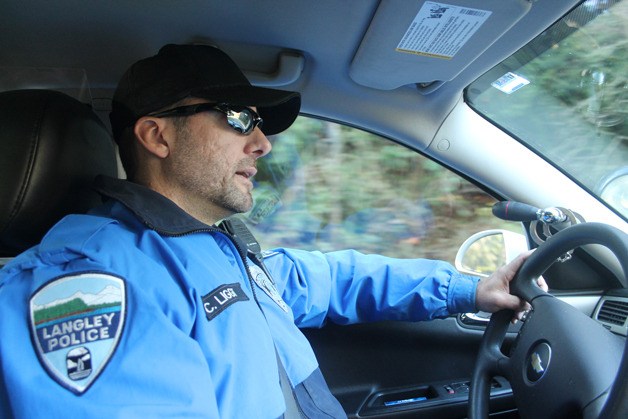Langley’s interim police chief has been plenty busy lately, and among his many duties is reconsideration of an old staffing issue — does the department need three officers or four?
The Langley Police Department is down an officer after former chief Randy Heston retired this August. David Marks was named interim chief while the city seeks its next top cop, and two of Marks’ recent duties were to evaluate his department’s activities and propose a department budget for the city’s $1.5 million general fund. The police force survey is expected to be presented in February or March.
Langley’s police department had a $384,706 budget for 2013, about 22 percent of the city’s total operating budget.
The law enforcement budget may be reduced if the city determines it should operate with two full-time officers and a chief. The department had four officers — including the chief — for 15 years but cut the number to three several years ago.
“The size of the department is a really important decision that should be based on data gathering,” said Mayor Fred McCarthy, adding that it was too early to speculate on the impact of reducing the department to three officers.
The reconsideration comes after Heston and former Mayor Larry Kwarsick successfully swayed the council last year to restore the number of officers to four for the 2013 budget, arguing that the cost of the additional officer was comparable to overtime expenses from a smaller, three-deputy department. A fourth officer also would have provided enough flexibility in the department’s schedule that officers could visit South Whidbey schools as resource officers.
For the past few months, since Heston retired in August, the 24-hour coverage schedule has been a bit tight for the LPD.
“We make it work because we have to,” said Officer Charlie Liggit as he patrolled the city Thursday afternoon.
With only three officers on the payroll, 24-hour coverage would average 56 hours for each cop. Even with overtime, that schedule is not entirely doable. To supplement their ranks, the city has reserve officers it can call upon, though their availability can be tough to nail down.
“The stars kind of have to line up,” Liggit said.
The staffing issue was raised briefly during a Langley City Council budget workshop Wednesday morning.
As of the end of October, Langley has paid $24,563 in overtime and $4,658 to reserve officers. Back in 2012, when the city had a full year of a three-officer rotation, the city paid $28,610 in overtime and $14,684 in reserve pay.
“Having four officers doesn’t mean we wouldn’t have overtime pay and doesn’t mean we wouldn’t have reserve pay,” McCarthy said.
That expense was still well below, however, the price tag of hiring an additional officer. Mayor Fred McCarthy identified the total cost of a deputy, including benefits, at about $70,000.
If the police force’s budget — the largest of all city departments — was to be cut, McCarthy said it was too early to know exactly where those funds would go. Some would be saved to pay for overtime and reserve officers, but the rest could be divided among the other city offices.
“We have a number of unmet needs in the city,” McCarthy said.
Fuel and maintenance expenses caught the attention of the city council. In 2013, $5,000 more than the previous year was spent on maintenance, which Marks said was needed to fix a main-seal leak and a transmission issue with one of the department’s Chevrolet Impalas.
Councilwoman Rene Neff proposed an unorthodox idea of looking into buying a fuel-efficient car, like a gas-electric hybrid Toyota Prius, for the officers. And, as unusual as it sounds, law enforcement’s use of vehicles such as a Prius are not totally unheard of.
Marks said he used one in a previous job with the state Department of Corrections for inmate transport. It came with drawbacks, however, like when an inmate was able to kick the door off its hinges; the window, said Marks, did not break.
“The priority for us is something bigger and more durable,” he said.
Another consideration proposed by the council was an all-weather vehicle. A four-wheel drive car or a sport utility vehicle could ensure the department’s ability to respond in a snow or ice storm, said Councilman Hal Seligson.



